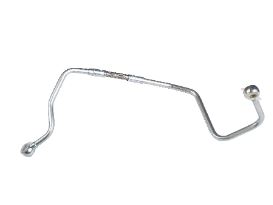PTFE Pipe Series is particularly well-suited for applications in the chemical and petrochemical industries due to its exceptional chemical resistance, high temperature tolerance, and ability to handle aggressive and corrosive substances. Here’s a detailed breakdown of its application and applicability in these sectors:
PTFE pipes are commonly used to transport highly corrosive fluids such as acids (e.g., sulfuric acid, hydrochloric acid), alkalis, solvents, and other reactive chemicals. These chemicals are frequently used in manufacturing, processing, and treatment plants.
PTFE is often used as a lining material for chemical storage tanks, reactors, and vessels to prevent corrosion, prolonging the lifespan of these structures and ensuring the purity of the chemicals stored or processed.
PTFE pipes are also used for the safe transport of corrosive or reactive gases such as chlorine, ammonia, and hydrogen fluoride in chemical plants.PTFE coatings are often applied to fittings, valves, and seals that come into contact with aggressive chemicals, enhancing durability and preventing leakage or contamination.
PTFE pipes are used to transport hydrocarbons, petrochemical byproducts, and other process fluids involved in refining crude oil and producing chemicals such as ethylene, propylene, and other feedstocks.Petrochemical plants often involve the handling of harsh chemicals and extreme temperatures. PTFE pipes provide essential protection from corrosion caused by acidic or sulfur-rich byproducts in refining processes, ensuring longer equipment life and reducing maintenance costs.
PTFE-lined pipes and reactors in petrochemical plants prevent corrosion from aggressive chemicals such as hydrogen sulfide (H₂S) and sulfuric acid, both of which are byproducts of crude oil processing.
Processing of Natural Gas and LNG: PTFE is also used in the natural gas and liquefied natural gas (LNG) sectors due to its resistance to sour gas (H₂S) and its ability to maintain structural integrity in extreme cold (for cryogenic transport and storage).
PTFE is one of the most chemically inert materials available. It resists virtually all chemicals, including the highly corrosive substances used in chemical processing (e.g., acids, solvents, bases, and reactive gases).In chemical and petrochemical industries, where exposure to aggressive chemicals is common, PTFE pipes are ideal because they do not degrade or react with the transported fluids, ensuring the purity of the substances and reducing contamination risks.
PTFE can operate within a wide temperature range, from cryogenic temperatures to 260°C (500°F). This makes it ideal for use in processes involving high-temperature reactions or the transfer of hot fluids.In the petrochemical industry, where both high and low temperatures are encountered (e.g., refining processes, distillation, cracking), PTFE’s ability to maintain its integrity under such conditions ensures reliable performance.

One of the most significant advantages of PTFE pipes in these industries is their excellent corrosion resistance. They can withstand long-term exposure to corrosive liquids and gases without degrading or leaching materials, unlike traditional metal pipes, which are prone to rusting and corrosion.For industries that deal with sulfuric acid, hydrochloric acid, or hydrogen sulfide, PTFE pipes provide an ideal corrosion-resistant solution, reducing the need for frequent replacements and costly repairs.
PTFE has a low coefficient of friction, meaning that substances (particularly sticky or viscous materials) do not easily adhere to its surface. This property is crucial for preventing buildup and blockages in pipelines that transport reactive or viscous chemicals.The low friction also aids in energy efficiency, as fluids move more easily through the pipes, reducing pressure loss and enhancing overall process efficiency.
PTFE pipes are highly flexible, allowing for easier installation in complex piping systems or areas with space constraints. They are also durable and long-lasting, even in extreme conditions of chemical exposure or temperature fluctuation.PTFE’s durability reduces the need for frequent maintenance, offering significant operational advantages in chemical and petrochemical facilities where system shutdowns for maintenance can be costly.
PTFE is chemically inert and does not react with transported substances, making it safer for handling hazardous chemicals. It also does not leach harmful substances, ensuring compliance with environmental and safety regulations.In the petrochemical industry, which faces stringent environmental regulations, the use of PTFE pipes helps in containing hazardous substances and minimizing leakage, ensuring safer operations.
The PTFE Pipe Series is highly applicable in the chemical and petrochemical industries due to its superior chemical resistance, temperature tolerance, and non-reactive properties. These features make it ideal for transporting corrosive, reactive, and high-purity substances, ensuring both safety and reliability in these critical sectors. While its higher cost and specific mechanical limitations may require careful consideration, the long-term benefits of using PTFE pipes often outweigh these challenges in harsh industrial environments.

 English
English Español
Español русский
русский












